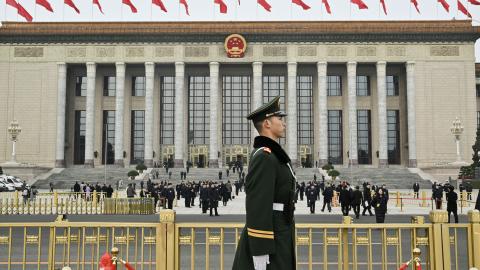Since the founding of the People’s Republic of China in 1949, the Chinese Communist Party has projected an image of a “peace-loving” civilization wronged by imperialism and devoted to harmony. Yet from the Korean War to Ukraine, from the Himalayas to the South China Sea, the historical record exposes a very different truth.
The CCP, not the United States, has been the principal engine of global instability since the end of World War II, as today’s China is a revolutionary regime whose survival depends on perpetual struggle, conquest and deception.
Communism, by its very nature, is a militant ideology. It regards peace not as a moral good but as a temporary pause between battles. Mao Zedong built his regime on the doctrine of permanent revolution, declaring that “political power grows out of the barrel of a gun.” Like the Soviet Union before it, the CCP must continually demonstrate its vitality through conflict to preserve its myths of infallibility and invincibility. For the CCP, aggression is not an aberration but an existential requirement.
That imperative explains China’s unparalleled record of military adventurism.
Scarcely a year after its founding, the regime sent millions of Chinese “volunteers” into Korea and transformed a regional civil war into a global conflagration that claimed millions of lives.
In 1954 and again in 1958, it bombarded Taiwan’s offshore islands of Quemoy and Matsu, inaugurating decades of armed intimidation across the Taiwan Strait. In 1962, China invaded India and seized border territory under the false banner of “self-defense.”
Only a few years later, Chinese and Soviet troops clashed along the Ussuri River in bloody battles that nearly triggered nuclear war between the two communist powers. In 1979, Beijing invaded Vietnam, launching a monthlong campaign that killed tens of thousands on both sides.
No other major nation since World War II has initiated so many wars and border conflicts. Yet generations of Western apologists — from the so-called FOCs (Friends of China) such as Henry Kissinger to today’s loathsome clowns such as Jeffrey Sachs — have continued to parrot Beijing’s propaganda that China is uniquely “peaceful” and “non-expansionist.”
That claim collapses under even the briefest historical scrutiny. Each of the CCP’s wars, large or small, was not defensive but ideological, an assertion of revolutionary dominance designed to remind the world that the party could never be challenged without consequence. Unable to confront the United States directly, the CCP also devised a long-term strategy of proxy confrontation.
In every major global conflict since the founding of the communist state in 1949, Beijing has been the hidden hand sustaining America’s enemies and prolonging instability.
The Korean War was the prototype. Had China not intervened, the conflict would have ended within months and the Kim dynasty would have disappeared into history. Instead, Mao’s intervention created the modern North Korean regime, a hereditary dictatorship that has menaced Asia with nuclear weapons for decades, propped up by China’s economic lifeline.
The pattern repeated in Vietnam, where China supplied Hanoi with weapons, equipment and advisers throughout the 1960s and 1970s, turning a limited conflict into a quagmire that exhausted American resolve. The purpose was never Vietnam’s freedom but the weakening of the United States.
Today, the same strategy persists under new guises. Beijing’s “no-limits partnership” with Moscow has made China the primary enabler of Russia’s war on Ukraine, supplying roughly 90% of the dual-use components, electronics and machine tools that sustain Vladimir Putin’s war machine.
Without the CCP’s support, Russia’s assault would have collapsed already under sanctions and attrition.
In the Middle East, China’s 2021 Comprehensive Strategic Partnership with Iran — a staggering $400 billion lifeline — has fueled Tehran’s capacity to bankroll Hamas, Hezbollah and other terrorist proxies. The Oct. 7, 2023, massacre of Israeli civilians was not just an act of Islamist barbarism; it was also the downstream consequence of Beijing’s decision to empower the world’s most prolific state sponsor of terrorism.
In Latin America, Chinese financing and political backing have transformed Venezuela’s regimes under Hugo Chavez and Nicolas Maduro into a regional aggressor now openly threatening to annex two-thirds of neighboring Guyana.
Whether it’s Caracas, Tehran or Pyongyang, every major threat to international peace today carries Beijing’s fingerprints.
These are not random episodes of opportunism. They form a coherent global strategy: to bleed the United States through endless peripheral wars, to fragment the Western alliance system and to reshape the world order in a way that normalizes dictatorship and punishes democracy.
The CCP’s method is to let others fight while it profits from the chaos, an updated version of Vladimir Lenin’s dictum that “the capitalists will sell us the rope with which we will hang them.”
The record is unambiguous. The CCP has fought or enabled more wars than any other power since 1949. Its ideology exalts struggle; its diplomacy cultivates instability; its economy fuels tyrants.
Although Washington’s foreign policy has often been imperfect, the United States has been a stabilizing force, defending free nations, rebuilding shattered economies, and anchoring the international order in law and restraint. Beijing, by contrast, equates peace with submission and “cooperation” with obedience. Wherever Chinese influence spreads, repression, conflict and fear soon follow.
The great lie of our time, animating throngs of blame-America-first tenured professors, think tank misfits, greedy Wall Street financiers and nerdy Silicon Valley upstarts, is that the United States is the source of global instability. The truth, visible to anyone who examines the wreckage of modern history, is that the CCP has never ceased waging war, whether by armies, proxies, economic coercions or ideology.
It remains the most destabilizing, most warlike regime on earth, with the world’s largest military force under strict command of the world’s only remaining real Marxist-Leninist communist party, energized by a creed that can never coexist with genuine peace.
Until such an existential threat is confronted and defeated, the world will continue to live under the long shadow of Beijing’s aggression and strategic sophistry.















